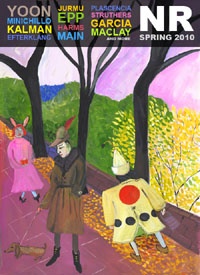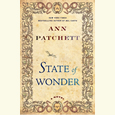Not Your Father's Fugitive
Vanderbilt MFA candidates launch a new literary magazine
April 7, 2010 Graduate students in Vanderbilt University's nationally ranked MFA program have launched a national literary magazine, Nashville Review. The online journal, which went live on April 1, is a daunting project the students "conceived of, pursued, and brought into being all by themselves," says poet—and Vanderbilt professor of creative writing—Kate Daniels.
As a web-based journal, Nashville Review features more than just the standard poetry, fiction, and reviews found in traditional literary magazines. According to an introduction at the site, "NR seeks to feature those forms of writing not often recognized as literature—music, comics, film, creative nonfiction, oral storytelling, dance, drama, art—alongside the more traditional forms of fiction and poetry." In addition to poetry by Rickey Laurentiis and Heather Derr-Smith and fiction by Pamela Main (among others), the debut issue includes music by Sufjan Stevens and Tyler James. There are interviews with poet Beth Bachmann and novelist Salvador Plascencia, as well. "It's just so exciting to be able to 'open up' a literary magazine and hear interesting music I would be unlikely to come across on my own, and read tags from literary editors who are writers, themselves, about the pieces. And ditto for the comics—I don’t read them generally and appreciate having them put in a literary context/frame that encourages me to expand my notions of what kind of 'writing' I want to read," says Daniels, who co-founded Poetry East, one of the top twenty literary magazines in the country, and so knows a thing or two about starting a journal. Vanderbilt, of course, has long and storied history with literary magazines.
The fact that The Fugitive, one of the most influential—and, at times, controversial—journals in history was also launched by members of the Vanderbilt University English Department doesn't worry Nashville Review editor Matthew Baker a bit. He recently answered questions from Chapter 16 about the site: 
Chapter 16: Why launch a literary magazine now, when so many other journals are struggling?
Baker: When we first started talking about launching a literary magazine, we knew it would have to have some sort of niche. We didn't want to launch Just Another Literary Magazine. Looking around, we realized that although thousands of journals were publishing fiction and poetry, a very limited number of them were publishing literary comics, and no one (that we knew of) was publishing lyrics and songs. We thought those forms of writing needed a home—they had no venue among literary journals. For us, that justified our founding a new magazine.
Chapter 16: Was it worrisome to you and the staff that Vanderbilt has such a rich tradition with literary magazines? Any concerns about the anxiety of influence?
Baker: And as far as The Fugitive goes—we really didn't have any concerns. Vanderbilt produces (and has produced) a number of well-renowned and influential publications; I'd say we were more excited to become a part of that, to make our own contribution, than worried about influence/tradition and so on.
Chapter 16: How did you get the word out when you opened the journal for submissions?
Baker: We had an overwhelming response when we opened the review up for submissions. I contacted Duotrope.com, which maintains a database of literary magazines—they posted us on their site, and within minutes we were getting submissions. We ended up with over 400 fiction submissions—this during a two-month reading period.
Chapter 16: This was a new endeavor for a still-new MFA program; any surprises for you and your staff as you put together the first issue?
Baker: I can't speak for the rest of the staff, but the biggest surprise for me was how generous the writers and musicians and artists we contacted were. The Spring 2010 issue features an interview with Maira Kalman, who has been really wonderful to us—she even let us use some of her art for the cover of the issue. Kalman's The Principles of Uncertainty is my number-one favorite graphic novel, so getting to interview her was a dream come true, but getting to use one of her paintings on the cover of our first issue was something beyond even dreaming. I have no idea why she's been so nice to us. Salvador Plascencia and Beth Bachmann both invested a lot of their own time, as well, by participating in interviews with our editors.
Chapter 16: Will there be a print edition eventually, or will this project exist exclusively online?
Baker: The review will always be online. We plan on doing things with Nashville Review—publishing films, audio recordings of oral storytellers, video recordings of live music performances, and so on—that you just can't do on the printed page.
Chapter 16: As a writer, what's your own primary genre?
Baker: I'm one of the fiction students here at Vanderbilt, but I'm interested in a number of genres: I write poetry, comics (write but don't draw—my drawing skills are unfortunately limited to stick figures and palm trees), memoir, nonfiction travel pieces, and on and on. Anything you can build out of words I'm interested in making.
To read more updates on Tennessee authors, visit Chapter 16's News & Notes page, here.

